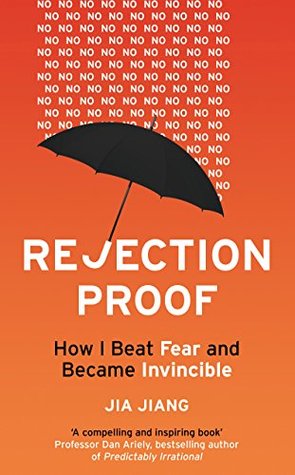More on this book
Community
Kindle Notes & Highlights
by
Jia Jiang
Read between
May 26 - June 14, 2024
Two days into my rejection journey, I had already learned my first big lesson: the way you ask a question—and how you follow through in the conversation—has an impact on the result you get. It might not change the outcome, but it can take a lot of the sting out of hearing no. Projecting confidence and staying calm—rather than cowering—had created a totally different experience. If I could build up that sort of confidence in my professional life, rejection might not have such a devastating impact on my trajectory. It also might not hurt so much.
When I was confident, friendly, and open, people seemed more inclined to go along with my request; even if they said no, they at least stayed engaged longer to ask questions. If I could just figure out the right way to communicate in each situation, I might increase my chance of being accepted—and also decrease my fears about a possible rejection.
The fear of rejection may have saved many of our ancestors from getting tossed out of their social groups, but by and large it no longer makes sense in our modern lives. In fact, it’s more baggage than a safety measure. If rejection fear were an organ, it would be an appendix instead of a heart. Yet its effect is much more damaging than the occasional appendicitis, because the consequence of not trying for new things due to the fear of rejection can’t be fixed by a simple visit to the emergency room.
If something can’t hurt me, then why should it scare me? It turned out it’s this question that proved to be pivotal in my fight with rejection.
Most of the time, when you really look at it, rejection is like the Wizard of Oz. We might be terrified of rejection when we’re asking for a raise, a date, an investment, or the approval we crave. We feel the word no comes at us with a loud voice, fire, and smoke. We feel it would really hurt us. But in reality, it is almost never that bad. Even if we don’t get what we ask for, we haven’t lost anything. It is rarely the case that our lives are in danger.
Through this experiment, I observed a very important fact: people could react to the same request very differently, and it said nothing about me. I was the same person posing the same question—“Can I work here for one day?”—to three different people at three different offices. Their responses reflected their own attitudes, sense of curiosity, and risk tolerance—which varied quite a bit among them.
A lot of people—including my pre-rejection experiment self—might lose confidence in themselves after getting a few rejections. Every time they ask for what they want, they feel that the “universe” is making a unanimous judgment on their merits. But Jennifer helped me see that this couldn’t be true. The “universe” is made up of people with diverse and often polar-opposite personalities, incentives, and backgrounds. Their reactions to a certain request reveal much more about them than about the request itself.
This job-seeking experience also sparked another paradigm shift. From that point on, rejection seemed less like “the truth” and more like an opinion. Other people were simply processing my requests, then giving me their opinions. That opinion could be based on their mood, their needs and circumstances at that moment, or their knowledge, experience, education, culture, and upbringing over a lifetime. Whatever was guiding them at the time I entered their lives, these forces were usually much stronger than my presentation, my personality, or my request itself.
Outside influences have an enormous impact on the way people see a situation—and those influences can change over time. The way someone feels about me, or about a request I’m making, can be impacted by factors that have nothing to do with me. If people’s opinions and behaviors can change so drastically based on so many different factors, why should I take everything about a rejection so personally? This simple but profound realization helped me to start taking the emotion out of rejection—and to look with new eyes at the decisions people make.
Through my rejection experiments, I began to realize that I could often get a yes simply by talking to enough people. Obviously, not every rejection attempt would ultimately yield a yes, especially some of the wackier ones. But I was surprised by how many times my persistence paid off—like it had with the apple experiment, and with my attempt to land a one-day-only office job.
Being patient and respectful when saying no is such a simple concept. But it’s amazing how often we don’t put it into practice.
Instead of sulking, just hanging on, or simply giving up after the first fifteen minutes, I treated the experience as a feedback tool, and quickly changed my tactics without abandoning the cause altogether.
The next time everyone accepts your idea or proposal without a hint of disagreement, you might want to stop for a moment and ponder if it is the result of conventional and group thinking. And if someone thinks your idea is “incredibly stupid,” consider the possibility that you might be onto something. Perhaps the question we should ask about an idea is not “How do I avoid rejection?” but “Is my idea worthy of rejection?”
Find Value: Repeated rejections can serve as the measuring stick for one’s resolve and belief. Some of the greatest triumphant stories come only after gut-wrenching rejections.
Rejection is human. Neither rejection nor acceptance is the objective truth about the merit of an idea or even a product. In my case, I mistook my uncle’s word for truth and thus gave up way too early.


